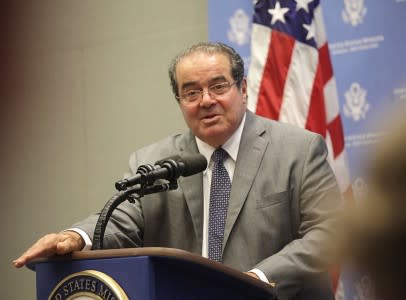Justice Scalia opines on changing clothes at work
On Monday, the Supreme Court held in a unanimous verdict that U.S. Steel workers can’t be paid for time spent donning safety gear at work. But with any opinion written by Justice Antonin Scalia, the wordsmiths are picking through the 18-page decision for a few choice quotes.
In Sandifer v. United States Steel Corporation, the Court said labor laws excluded unionized employees from being paid during time “donning and doffing” safety gear before and after shifts, unless a labor agreement was in place for such compensation.
Writing for the Court, Scalia said such acts weren’t really different than changing clothes.
Current and former workers at U.S. Steel’s Gary, Indiana, plant argued that flame-retardant jackets and pants, hard hats, and other items were “personal protective equipment,” not clothing.
As with any Scalia opinion, an analysis of specific words is an assumed factor. In this case, Scalia picks apart the origin and meaning of the word “clothes.”
After consulting Webster’s and the Oxford English Dictionary, Scalia determines clothes are used for “covering for the person; wearing apparel; dress, raiment, vesture.”
Scalia then dissects the argument that Webster’s Second includes a narrower definition of clothes, which says they are worn for decency and comfort.
“We see no basis for the proposition that the unmodified term ‘clothes’ somehow omits protective clothing,” he said.
He also discounts the argument that the definition of work clothes is so broad that it includes “bandoliers to barrettes to bandages.”
“The statutory context makes clear that the ‘clothes’ referred to are items that are integral to job performance; the donning and doffing of other items would create no claim to compensation under the Act,” Scalia says.
Next, Scalia picks part the meaning of the word “changing.”
“Although it is true that the normal meaning of ‘changing clothes’ connotes substitution, the phrase is certainly able to have a different import,” he says. “We think that despite the usual meaning of ‘changing clothes,’ the broader statutory context makes it plain that ‘time spent in changing clothes’ includes time spent in altering dress.”
And then there is the question of how federal judges would determine what constitutes clothes (or clothing) when and where they are doffed or donned at work.
“The question is whether the time devoted to the putting on and off of these items must be deducted from the noncompensable time. If so, federal judges must be assigned the task of separating the minutes spent clothes-changing and washing from the minutes devoted to other activities during the period in question.”
In his conclusion, Scalia says, “That said, we nonetheless agree with the basic perception of the Courts of Appeals that it is most unlikely Congress meant [the statute] to convert federal judges into time-study professionals.”
Recent Scalia Stories
A look at the Justice Antonin Scalia’s most unusual word choices
More quotes from Justice Scalia’s speaking tour
Justice Elena Kagan talks about privacy cases, hunting with Scalia
A damning dissent: Scalia’s dissent for the ages in the DNA case


